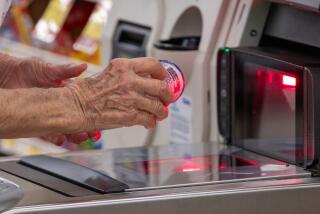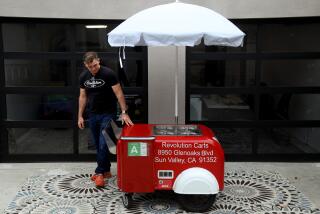Device Stops Grocery Cart Thieves in Their Tracks
- Share via
SAN DIEGO — They carry bags of groceries, sure, but shopping carts are far more versatile. They serve as a portable suitcase for transients, a go-cart for children, a laundry hamper for apartment dwellers and a barbecue pit for beachgoers.
The humble carts are so popular that grocers spend millions of dollars annually trying to keep wayward carts on their property.
CartTronics, a San Diego-based company, has developed a cheap alternative--a device that locks the cart’s front wheel when it rolls outside the parking lot. It’s the grocery store’s equivalent of a car alarm and the device is catching on with chains nationwide.
“It’s virtually foolproof,” said David Perisher, manager at Molly Stone’s Market in the upscale Pacific Heights neighborhood in San Francisco. “You try to get a cart off of my lot, you can’t do it. Because that front wheel locks down, all you can do is drag it, it creates so much resistance.”
Perisher installed the Cart Anti-theft Protection System, or CAPS, last fall on his 60 carts, which have all stayed put. Saad Hirmez, owner of the Apple Tree Market in the San Diego community of Ocean Beach, has had the same success with his 35 carts since last May.
“Zero carts lost. Impressive, huh?” Hirmez said.
The Supermarket Institute in Washington estimates that a shopping cart is stolen every 90 seconds in the United States. About 1.8 million shopping carts were taken from retail stores last year at a replacement cost of about $175 million, according to the Washington-based Food Marketing Institute. An additional $117 million was spent by grocers to hire contractors to retrieve abandoned carts.
Those were staggering, but encouraging statistics to Jeff French, chairman and founder of CartTronics. After a friend told him about the problems his business had with constant cart thefts, French decided to invest in a solution. He and several others spent the next few years testing and perfecting CAPS.
What they came up with was a system controlled by a low-frequency radio signal. An antenna is installed in the ground around the supermarket’s perimeter, delineated by a painted stripe. The antenna, not affected by climate or temperature, emits a low-frequency radio signal that, when the cart passes over the stripe, triggers a plastic cover to drop over the wheel. The wheel then becomes useless, but there is no damage to it should a customer try to force movement. Store employees unlock the device with a hand-held remote.
Installation takes less than a day and costs between $18,000 to $20,000 for a supermarket with 200 carts, French said. Stores where theft is prevalent can recoup that investment within months, he said.
About 50 stores in California, Kentucky, Nevada, Oregon and Texas are using the device, including the California-based Safeway supermarket chain and its subsidiaries like Vons. French said four of the top 10 grocery chains operating in the United States are expected to add the device to their shopping carts this year, but he declined to name them since contracts are still under negotiation.
A recent convert was Super Warehouse Foods in suburban Houston, which used to lose hundreds of shopping carts annually because customers would push their groceries home but weren’t considerate enough to roll the empty carts back to the store.
“Now, it’s really trimmed down,” said store manager Daniel Rivera, who added that there are a few determined shoppers who have dragged or carried the disabled cart home.
There are other anti-theft devices on the market, but they have proved problematic, grocers said. A fifth-wheel system designed to lock if the cart was raised over a curb often engaged accidentally, even if the cart wasn’t lifted. A pay system was too cumbersome--shoppers plunked down a quarter to unlock the cart and the coin was returned when the cart was placed back in the corral.
Erecting bars at a store entrance to prevent carts from going into the parking lot also kept out physically disabled customers, a violation of the Americans with Disabilities Act.
There are few glitches with the CAPS system, or grumbling from customers. During an afternoon at Apple Tree Market, most shoppers said they liked the added security.
Ocean Beach resident Judy Hurst said she used to dread going to the store on a big shopping day for fear there wouldn’t be a cart available. Now, she always finds one, and delights in pushing it to the perimeter, just to test system. Sure enough, less than a foot from the stripe, the wheel locked.
“This is nifty,” she said.
More to Read
Inside the business of entertainment
The Wide Shot brings you news, analysis and insights on everything from streaming wars to production — and what it all means for the future.
You may occasionally receive promotional content from the Los Angeles Times.








